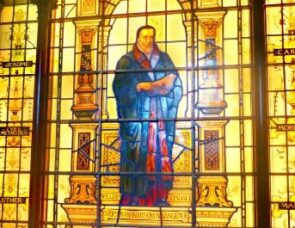An RE outline written by Chris Hudson of the Barnabas in Schools team

Introduction
Lesson Aim
To re-discover the impact made by the first (decently translated) English Bible
To explore ideas about the Bible
Background
William Tyndale has been called the ‘hidden father of the English language’ because his translation of the Bible made English respectable, formalising a whole range of written spellings and speech patterns for the first time. Before him, English translations were based on second-best translations from the Latin. Tyndale went back to the original Greek and Hebrew to start again and created an amazing piece of sacred literature.
He also changed the way people thought about their faith in God by enabling them to read the scriptures in their own language. This made other ideas more thinkable as well, such as ‘Do we need a king?’ For his pains, Tyndale was exiled, imprisoned and finally executed. Shortly after that, the authorities took his translation and made it (with a few adjustments) freely available in every church building in the land. Incidentally, the Authorised Version published in the reign of King James I used about 85% of Tyndale’s translation – and it’s been said that the other 15% isn’t as good as his!
Preparation
Most of the background information needed for this lesson and the ideas for how to make the material accessible to the class are contained within the development section. However, the story introduction to this topic can be found at The Burning Books – a story to introduce the impact of William Tyndale.
There are also worksheets available: The Burning Books – Worksheet A and Worksheet B.
Development
Reinforcement of RE concepts
Hold up a Christian Bible. Explain that it is a library of 66 books gathered together over hundreds of years, and that it contains history, poetry, advice, letters and biography in its pages. It has been said that the Bible is ‘the source book of Western civilisation’ (D.H. Lawrence), meaning that the biggest ideas about ‘who we are’ and ‘how to live’ over the last 1000 years all started in here. It’s the single most important book for Christians. Muslims treat it as a holy book, and Jews call the first part of it (what Christians call the Old Testament) their own Hebrew Bible. Discuss why many people in this country don’t know very much about it. Then explain that in Tudor times having an English Bible could be very dangerous, and read the story Burning Books – a story to introduce the impact of William Tyndale.
Afterwards, use the worksheets A and B to explore the personality of William Tyndale and to enjoy some of his translation.
Create a ‘Wanted’ poster for William Tyndale, also offering a reward for information that would lead to the arrest of anyone reading his Bible.
The Bible has been likened to a two-edged sword (Hebrews 4:12), a lamp (Psalm 119:105) and a hammer (Jeremiah 23:29). Why do you think these images were chosen? Use these ideas to create calligrams, where the letters of the words ‘Holy Bible’ have been distorted to look like the shapes of some of these images.
PSE / Thinking skills
- It’s easy to think that the most significant changes in the world have been brought about by spectacular deeds. Tyndale’s translation caused a massive sea-change in the English-speaking world, yet he spent a great deal of his life beavering away in libraries as a scholar of Latin, Greek and Hebrew. What we learn now can have great consequences for ourselves and for others when we are older. Discuss which parts of the school curriculum could do this. If you could add something else to the school curriculum that would be useful in later life what would it be?
- Books can be dangerous, because they are full of ideas – and people do things when they get ideas! Suppose you were in charge of a country and wanted to stop a book from being read, how would you do it? Write a persuasive argument for/against the idea that books should be accessible for all people. This argument can be extended to include discussion of Internet use and censorship.
Language, Literacy and Drama work
- The Bible has been translated into thousands of languages and dialects, but the people who do it always face a problem – that of making the people who read it understand all the imagery. (Having Jesus saying ‘I stand at the door and knock’ doesn’t make sense to someone who has never seen a door!) Try this for yourself. Retell the story of ‘Daniel in the lions’ den’ (Daniel 6:1-24) for an Inuit (Eskimo) Indian audience who have never seen a lion – or a den! (What wouldthey have seen that you could use?)
- Design a logo for Tyndale’s translation of the Bible, incorporating two ideas: that it is very dangerous, and that it is also about giving people a new hope. Also design the sleeve jacket and write the book blurb.
- Role-play the two main characters from the story to introduce the impact of William Tyndale (see link above), using hot-seating to examine their motivation.
- Research the following historical themes that relate to parts of this story: the Reformation / Henry VIII and the break with Rome / The Authorised Version / Charles I and the Divine Right of Kings / the English Civil War
Glossary
Bishop: a senior person in the Church, in charge of a large area (diocese)
Carter: a person driving a cart, of course!
Make amends: put things right
Heresy: telling lies about God
The Pope: the head of the Roman Catholic Church

 Download
Download